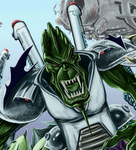 Hi Guys,
Hi Guys,When I first decided to write this particular series of three Blogs, I was thinking of various conversations I have had in the past thirty years, during which time the situation has seen an ongoing growth in the ever increasing divide between the visual and narrative content, in both qualitative and quantitive terms, with both my fellow professionals, editors, publishers, students and fans.
There have been some major changes in comics, over this period, but the main ones for me have been:
- The systematic dumbing down of content here in the UK, both in the visual and the narrative
- The growing of the content with the age of the readership in the US comics and 2000AD here in the UK
- The shift from fun light-hearted stories to grim, gritty, depressing ones
- The shift in storytelling styles from different approaches to the single decompressed technique
- The systematic breaking down of the ideology, ethics and morality of what makes a hero
- The advent of the anti-hero
- The convoluted continuities within the US comic books
- The Geek element within comics both pro and fan alike
- The creation of creators rights in the USA, due to pros like Jack Kirby, Neal Adams and Steve Gerber
- The massive increase in costs when purchasing comics
- The fall in the number of male readers
- The growth of Manga
- The growth of the female reader due to Manga
- The Death of the Newsstand
- The Birth of the Direct Market
- Comics Conventions
- The growth of the Internet – which could be the saviour for the future for this kind of storytelling
- Internet Piracy – the new threat and scourge to publishing
And this, which is to me the worst change we have seen: - The loss of children from comics reading and collecting due to the lack of vision and thus content from the publishers
I plan on looking at all the many positives, as well as all the many negatives and look forward to hearing what your views are towards the situation we find ourselves now in.
The Blogs may not follow the exact order of the list here and will at times meander backwards and forwards and revisit themes from time to time, but rest assured I intend to try to cover all the bases as in depth as I can.
I have decided to run with the loss of children, dumbing down of content and growth of the content in line with the readership age aspects with this first one.
When one looks at material produced here in the UK in the nineteen-fifties for an audience, whose visual stimulus came from the visual content of comic books, children’s books and for adults magazines, alongside none CGI made films and for the lucky few TV programmes then one is forced to wonder why on earth we have seen such a decline in the quality and content of the products the publishers put to market.
This is in no way a slur on the creatives involved, as I myself have been made to work in this way in the past, and is one of the reasons I left comics for a few years, back in 1999 – not the deciding one, but one, which greatly contributed to the fact.
With that in mind in regards the visual aspect of comics inspiring the imaginations of the children back on the 50’s and the use of their own imaginations, in lieu of today’s wonderful array of toys, games, video games, computers, DVD’s, animated feature films and TV programmes, then I have a couple of questions to put forward.
In today’s mass market, full of short-lived licensed IPs, produced by a repetitive and ill-thought-out ideology, why would the children of today with their world full of the wonderful technology and a great visual sense, expecting the same monumental epic spectacle they see on the TV each day, or on their computers, or games consoles, or in the magnificently detailed toys on their shelves, look to comic fare that is in no way comparable with that produced in the 50’s?
Also why have the publishers suddenly taken it upon themselves to treat children as though they are sub-normal beings, with little or no capacity to learn? We expect them to perform wonders in schools with SAT tests and the like, from a very early age and yet talk down to them in the comics they are given and truth told here in the UK there are only a few publications with any comic section in them, as they all take on the mantle of magazines, much like young copies of the adult world of celebrity magazines.
With these two things in mind we have to suppose that the children of the 50’s without the wonders we shower today’s children’s senses with had vastly superior product thrust into their eager hands each week with fully rendered paint jobs on the comics, which back then were throw away and cheap for the consumer and their visual sense was inspired by and nurtured by the work inside their pages.
The stories were not just fantasy stories and touched on many different subjects, a lot of, which was educational in as far as they were based on factual accounts, or at least none fictional, like biographies and the like – and these were for children without the visual sense of those young folks of today and who did not have the knowledge base of today’s Internet.
Yet today’s children, and this has been the case for certainly the last 20 – 30 years, have been systematically force fed, increasingly dumbed down and inadequate content to both keep their attention spans and to inspire them in the least.
Parents are continually complaining about the type of content when they look to buy a comic for their children, the lack of content of any worth inside of them, the lack of originality and then to add insult to their injury, the over inflated cost of doing so.
Nowadays the US comics, which are being re-printed over here often contain content in them that is not suitable for younger children, as the content, as we know, has been growing with the age of the average reader for years, so that puts sales of those away from the children. Add to that the content, or rather lack of anything of worth, in the eyes of many parents, on most of them and it is hardly surprising that the publishers find themselves with a dwindling market, when for whatever reason they continue to arrogantly ignore the needs of the children and their parents.
I remember years ago a UK children’s programme being taken off air as it was considered both out of date and containing content, which caused children to develop late learning problems, especially with speech, due to the way the characters spoke, or rather communicated with each other – that programme was Bill and Ben.
Consider today’s market where the children are bombarded with grunts and squeaks and high-pitched squeals from programmes such as Telly Tubbies and Pocoyo, Igglepiggle, Makka Pakka and their ilk. Now personally I don’t see anything wrong with these programmes, except in the context of this Blog.
It seems to me that the more advanced we become, as a society, the more dumbed down the content becomes for children. This is certainly the case for children’s publishing, in both comics and books in the UK.
Whether it is some surreptitious PC movement pandered to by those in whose thrall they exist, or a complete and utter misunderstanding of the needs of children, or indeed what they actually are, which is small versions of us with a great capacity to soak up and learn information on a par with the best computer systems around, is up for the vote.
The main problem is however that publishers have not sought to keep up with the children and have been quite content to leave the kids behind in this foolhardy quest to have comics, to quote the media and those creatives amongst us that agree with the philosophy, “Come of Age”. In their aim to make them respectable to the mass market of the adult reading public they have committed a grievous mistake and forgotten about the kids seeing their continued involvement in the worlds of comics as an unnecessary hindrance to the telling of great literary pieces.
The trouble with that ideology is that unfortunately, despite what some creators think…the man in the street, Joe Public, DOES NOT READ COMICS, certainly not regularly and for the mass majority of people on this planet NEVER read comics and in a great many cases have never, ever even read a single one.
Now this may sound like sacrilege to the fanboys and many creators out there that think differently, but please explain to me, if this is not a truth, why there are not better sales on ALL comics.
Sure the biggest growing sector of publishing in recent years is in graphic novels, but it would be interesting to see how big even this sector is without the collected together trade paperbacks and hardbacks of the back reprint/back issue replacing and also the latest current superhero genre. The last few years have thankfully seen a rise in graphic novels with different kinds of genres in them to the superheroes. I feel that these different kinds of story are going to continue to outgrow that jaded and overdone genre. The beauty and advantage of the album/graphic novel, over the comic book is it stays on the shelf indefinitely as opposed to the comic book.
This still does not address the inclusion of children in the equation though and we are still left with a growing void and a potential set of reasons for why there are such huge literacy problems in the UK, at least in part as a contributory factor.
The bottom line is whilst the current publishers like US comics publishers Marvel, DC, and 2000AD here in the UK are proud of the fact that their audience has grown older with their comics becoming more adult-oriented over the past 50 years in the US and the past 30+ here in the UK, the addition of new readers, in quantitative terms, has not grown at all and has in fact shrunk, as fewer children read them.
Another problem with losing children as comics readers is that instead of looking seriously at the roots of the problem we have been given every excuse under the sun, rather than admit the failings of the publishers to address the situation with the loss of the child reader.
We have been regaled with long missives about how the advent of first the video game took away readers, with expensive game consoles and their equally expensive games replacing the far cheaper comics.
We were then told it was children watching the new videos, later to become DVDs to replace that argument.
Next it was the computers, which stole away the attention of the kids.
When all along it was the publishers themselves who allowed the children to drift away in droves and they patted themselves on the back as the readership “matured” and the “comics came of age.”
I have heard countless comics creators spout this same rhetoric time and time again, rather than admit the failings of the publishers. There is a sector of creators even that will not even accept that it is the advent of this new kind of mentality within comics publishing that is creating the ever-widening void between children and comics.
There are some creators and publishers, I feel, that are ashamed to admit that comics are, in the eyes of the general public, the reading material of children and those that have continued to read them. There are a lot of folks out there in real land that even support the idea that comics are for the semi-literate at best, which is totally untrue, but that mindset does exist and to deny it helps the demise of the readership foundation base.
To me comics are comics and there is a place for all kinds, but as I have said often here on my Blog, not just one and not one which contains the material of today’s fare. The market is expanding away from the superiority of the superhero genre and the graphic novel is helping in that respect, but we still have a long way to go even there.
The trouble even with the mass majority of graphic novels, as opposed to the European albums is we still alienate the children and continue to publish, in the main a continuation of the same old super-heroics, or stories aimed in no way at the children’s market, almost as though the books only have acceptability and respectability in the real world if children are excluded and the story is of an “adult” nature.
I would rather this was looked on as “adolescent” in content and delivery and add that acceptability and respectability comes from the actual content and how well the story is both told and shown, not from gratuitous violence, swearing, or dark storylines, which often depict and sicken with their use of overtones of psychotic rhetoric amongst the so-called superheroes.
Children, just like adults, in fact more so, as they find it hard to lie, see though the smoke and mirrors tactics employed by those wishing to exclude them, or talk down to them and will not read garbage.
Going full circle for this Blog until Part 02, children will read comics and still continue to be blown away by them, when we visit the primary and secondary schools, but they have to be wowed. They do not want to see talking heads, with people standing around talking. They do not want masses of characterisation, or overwritten prose, please if you want to do this write a novel guys they want action as well. Like we did as kids they want to see epic, spectacle, huge things and small things, action, suspense, things that make them step back mouths wide open and to be left speechless.
Is that so different from what we as adults want, escapism from the everyday realities of life in the real world? I think not and imagine the confined imaginations of a child, unfettered by the cynicism of adulthood, without an adequate escape route.
The comics are a vastly underrated teaching aid and a much-missed source of reading material for children. Children need to be stimulated and excited and to express themselves – with comics we can give them all that – if only we did.
There is an almost underground movement at the moment, which I predicted would happen years ago now, but it fell on deaf ears for a while whilst the world caught up. Not only are there creative folks wanting to leave behind the depressing daily trappings of the new type adventure comic, now there are readers who want those halcyon days of comics back again, theirs to enjoy once more and when this happens, then, maybe, just maybe the children will become involved once more not just because they can finally see them again, but because what they see inspires them to read more again.
Of course there are many other reasons they no longer read them in large numbers, but like the other items on my list at the beginning of this Blog those I will leave for a future post here.
Until next time have fun!
Tim Perkins…
Thursday 18th 2010












































2 comments:
some good points raised.
I do feel that since the dark knight and watchmen comic publishers have produced stuff that has grown up with the reader, and ignored the new kids.
It's pretty hard to find a us comic that isn't suggested for mature readers.
And kids today are constantly entertained with their Ds or psp (I know mine never seem to be off the things) add to that about 10 kids channels and it's easy to see why kids comics are having a hard time
Hi Nigel,
Great to hear from you.
I think that the publishers have allowed kids to look at the other fantastic distractions they now have, because of a short-term view on the market.
The comics may have "matured", but now, with the market continually shrinking, kids may never pick them up again unless the publishers seriously want them to.
It seems to be indicative of US and UK comics, elsewhere kids still seem to read them, but then again the access to them is still there.
Kids will buy them, they just do not have access to anything, here in the UK especially, except the kids magazines, which profess to be comics in looks at least.
Hopefully we are on the cusp of a change and children will he included once more into the mix.
The video game industry did it, the sportswear industry did it and Football here in the UK did it too, they simply made their products street cred and an indispensable item for kids to own.
The comics industry needs to take a leaf out of those particular books and I think some of this we will see soon.
Thanks again for dropping by.
Best Wishes,
Tim...
(''j)
Post a Comment